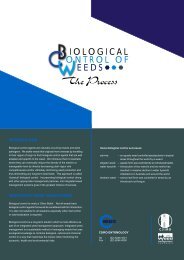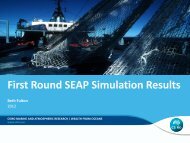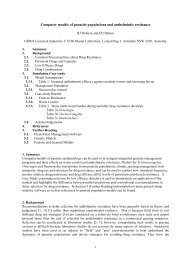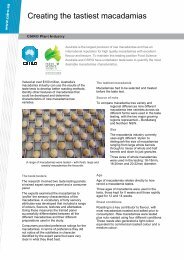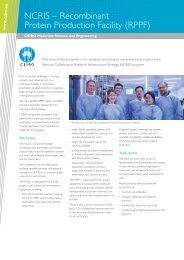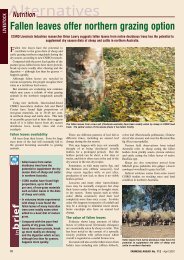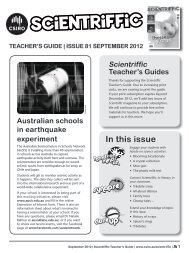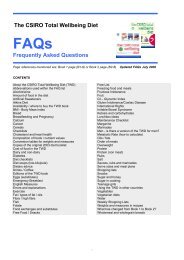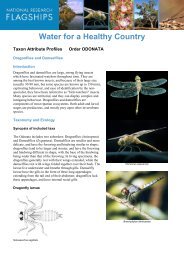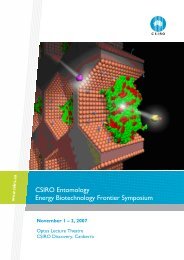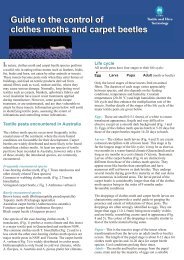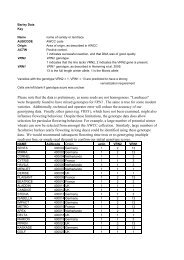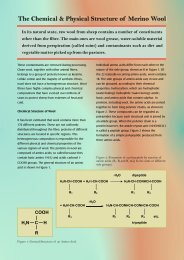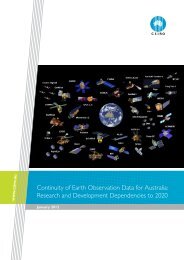WfHC - cover page (not to be used with pre-printed report ... - CSIRO
WfHC - cover page (not to be used with pre-printed report ... - CSIRO
WfHC - cover page (not to be used with pre-printed report ... - CSIRO
You also want an ePaper? Increase the reach of your titles
YUMPU automatically turns print PDFs into web optimized ePapers that Google loves.
Paddy Yam‟s dissatisfaction about <strong>not</strong> <strong>be</strong>ing paid sufficiently for the work he did is<br />
counteracted by his sense of achievement, but also concern that the way of life he knows<br />
has <strong>be</strong>en superseded:<br />
If I can think quiet, sit down. I think it over, what I done, what I seeking in my life. Who‟s<br />
ever going <strong>to</strong> do that sort of thing? But <strong>not</strong>hing now! It‟s bloody chopper, chopper. Chopper<br />
mustering, chopper mustering. No good.<br />
Paddy Yam<br />
Speaking about his own country near Coen, Philip Port <strong>not</strong>ed the tension <strong>be</strong>tween his<br />
perspective as a traditional owner, ex-cattle worker, and horseman, <strong>with</strong> the objectives,<br />
methods, and needs of contemporary conservation and National Park management:<br />
And at those National Park meetings I have an argument <strong>with</strong> them. „You got $40,000 <strong>to</strong> do<br />
fencing or go chase lizards or birds or something?‟ I jump on a horse and take them out.<br />
Go walkabout you know. I‟m a horse bloke. I love my horseback. And they all pack their<br />
mo<strong>to</strong>r car up, throw their gear on and drive back home. I say: „Righ<strong>to</strong>, I‟ll see you when I<br />
get back home‟ then I just ride through the country. I love it. That‟s how I enjoy my life. And<br />
they say „oh we‟d love <strong>to</strong> go up here and have a look at this country‟. I ask „you <strong>be</strong>en up<br />
there?‟ and they say „No, we want you <strong>to</strong> follow us up there and show us.‟ „I don‟t know<br />
mate, I might do something else <strong>to</strong>day‟. „No, we‟ll pay you <strong>to</strong> come <strong>with</strong> us.‟ Do you see?<br />
And then you got <strong>to</strong> lose a day by going <strong>with</strong> them. And you take them up and show them<br />
around and they say „<strong>be</strong>autiful this place got everything, <strong>be</strong>autiful!‟. And they drive around<br />
taking pho<strong>to</strong>s of everything. But <strong>to</strong> me I gotta come back and say, „ok they giving me the<br />
right <strong>to</strong> take them up there, it don‟t give them the right <strong>to</strong> outdo me!‟ See that country is<br />
very different. You come out there, and we just go for a little drive and climb a little hill, just<br />
go for a little walk, come up a little hill and you can look all over. And you take a pho<strong>to</strong>, and<br />
the GPS, [and more] pho<strong>to</strong> taking. „Beautiful country‟ [they say]. I reckon its <strong>be</strong>autiful<br />
country <strong>to</strong>o! I grew up there, all around it! I‟ve <strong>be</strong>en everywhere! And this is the thing now;<br />
we have this Wild Rivers, National Parks, that‟s the thing now we can‟t work out. Our<br />
country is like that, it‟s good for [parks], but you won‟t get [conservation] people on<br />
horseback <strong>be</strong>cause they are <strong>not</strong> like us. [In] our time we were <strong>to</strong>ld <strong>to</strong> go out there, do the<br />
job and that‟s it.<br />
Philip Port<br />
The older cattlemen are proud of their working tradition and of the knowledge, independence,<br />
and self-respect it gave them. Alan Creek descri<strong>be</strong>s how they were foc<strong>used</strong> on the cattle, but<br />
also aware of the need <strong>to</strong> consult locally, and understand local variations in conditions. Philip<br />
Port <strong>not</strong>es how knowledge and experience of the country has changed <strong>with</strong> different kinds of<br />
work, particularly the transition from cattle work <strong>to</strong> conservation management. Nevertheless,<br />
the cattle era at Oriners was crucial in people maintaining and establishing connections <strong>to</strong><br />
the area during the colonial and pas<strong>to</strong>ral period.<br />
2.5.5 Old and new connections<br />
The younger Kowanyama people resettling Oriners after it was purchased back in 1990<br />
enjoyed redis<strong>cover</strong>ing evidence of the <strong>pre</strong>vious his<strong>to</strong>ry of residence there, and were reluctant<br />
<strong>to</strong> remove or damage it, as Edwin David recalled:<br />
I <strong>used</strong> <strong>to</strong> stay in that old hut there. Sleep in the back shed there. Philip Yam went up there<br />
and he saw my name in that shed there. He said „you <strong>be</strong>en up there at Oriners there?‟ And<br />
I said, „yeah, I was up there when I was nineteen‟. He said „that was a long time [ago], your<br />
name is still there.‟ I was still asking about that shed and they said „no that shed is still<br />
there‟ and I said „you blokes <strong>be</strong>tter knock im down‟! But they said „no, we‟ll keep that‟.<br />
Working Knowledge at Oriners Station, Cape York<br />
95



